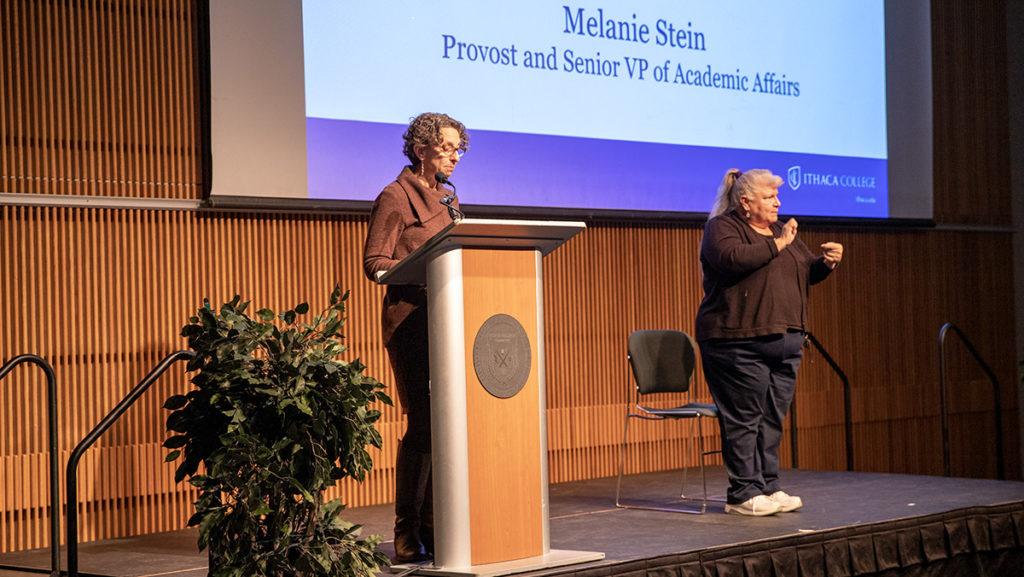Ithaca College faculty, staff and some students attended the first All-College Gathering of Spring 2022 on Jan. 26. College leadership spent the noon hour session speaking about student success and retention, shared governance and the Ithaca Commitment.
President La Jerne Cornish began the gathering with an overview of her travels for the Inaugural Tour. Cornish will travel to Austin on Jan. 30, Dallas on Feb. 1 and Tampa on Feb. 23. Then, later in the spring, she will visit Florida, San Francisco and Chicago. She addressed the staff and faculty in the audience and commended them for their ongoing work to improve the student experience.
“The greatest takeaway from the tour has been that these visits have affirmed the vision and mission of this institution,” Cornish said. “As evidenced by the fondness and love our alumni and their families have for IC, your work with our students is the reason why our alumni and our families feel the way that they do.”
Cornish’s remarks were followed by presentations about student success and retention from Provost Melanie Stein; Laurie Koehler, vice president of Marketing and Enrollment Strategy; Elizabeth Bleicher, dean for Student Success and Retention; and Kirra Franzese, associate vice president and chief human resource officer.
Shared governance
The Board of Trustees, President’s Cabinet and faculty are the primary groups of shared governance, and over winter break, representatives from these groups had an all-day retreat in Klingenstein Lounge to speak about the major challenges facing the college. Stein said the retreat was facilitated by Mary B. Marcy, the author of “The Small College Imperative: Models for Sustainable Futures,” and president emeritus of Dominican University. Marcy is a consultant for leaders at other institutions to help manage change, promote student success and reinforce shared governance.
The retreat focused on the challenges as well as the solutions, which Stein said revolve around demographic changes, shrinking enrollment, staff and faculty reductions, pandemic stress on employees and students, financial and budget stress as well as leadership transitions and lack of trust.
“We had some very frank conversations about trust,” Stein said. “This conversation had its difficult moments, but I believe it was productive. I’m hopeful that it will contribute to moving us forward with more of a sense of trust and common purpose. Shared governance is the structure which lays out broadly how we’ll work together to run the institution and lack of trust really hampers our ability to work effectively together.”
To improve shared governance and create a more integrated community, Stein said college leadership is going to talk to the Staff Council and Student Governance Council, begin a project to create a campus value statement about shared governance, and set up a series of focus listenings for the campus community centered on the themes that emerged during the retreat.
The Faculty Council discussed shared governance in its executive meeting Jan. 24. Ellen J. Staurowsky, professor in the Department of Media Arts, Sciences and Studies and member of Faculty Council, sent The Ithacan a statement regarding the private meeting.
“Faculty Council affirms the positive plans put forward by the Shared Governance Retreat, and looks forward to the reporting out of the values statement about shared governance and the series of focused “listenings” that will take place with the campus community,” Staurowsky said via email. “Faculty Council would like to express their gratitude to all who attended the Shared Governance Retreat.”
Ithaca Commitment
Koehler spoke about the Ithaca Commitment, which she described as a commitment to simplifying the financial aid process and lessening the financial burdens for students and their families. She said one key component of the initiative includes a four-year financial forecast and a direct cost increase cap. This allows prospective students to know what it will cost to attend the college for all four years and the maximum percentage that their direct costs will increase in each of the four years.
“This also gives us an advantage in the marketplace,” Koehler said “Other schools are not doing this. … Survey data tells us that in this past year, the transparency it provided was influential in [80% of] students’ decisions to enroll this fall.”
The college surveyed the impact of the free, one–credit course and up to two discounted courses new students are offered the summer before their first semester. Koehler said the data showed these courses made a positive impact on both students’ academic performance and retention.
Koehler also said another component of the Ithaca Commitment is a streamlined financial aid process and a newly-designed financial aid package which includes one-on-ones with a financial aid counselor and the elimination of the CSS Profile. Appointments with financial aid counselors are also available to current students.
“This past year, we saw over half of our admitted students who enrolled take advantage of that individual appointment to walk through the whole package, talk about financing options and make good decisions,” Koehler said.
Student success and retention
Koehler also said 16.8% of students were not retained from Fall 2021 to Fall 2022. Bleicher said the college is trying to understand the student experience sooner — before students are choosing to leave the college. According to Koehler’s presentation, the Fall 2022 retention rate is 83.2% which she compared to right before the COVID-19 pandemic when the Fall 2021 retention rate was 87%.
According to data in Koehler’s presentation, 1.5% of students who left the college between Fall 2021 and 2022 took a leave of absence, 6.4% dropped out and did not transfer and 8.9% of students transferred to another institution.
Koehler said the college is aiming for the Spring 2023 retention rate to be 85.2% with a long-term goal of an 88% retention rate.
The Center for Student Success and Retention launched in August with just three staff members to focus on supporting students and increasing retention. One way the center has worked to do this is through the Students Success Dashboard, which is currently in beta testing among some faculty and staff. The Dashboard offers pre-existing information the college has on students — displayed on one platform — while also allowing a student’s individual support network to see how they are doing.
“In those instances when students are prepared either to take a leave of absence or transfer, they’re interacting with the center as well, but at that point, we haven’t seen that coming, and we’re trying to get ahead of them,” Bleicher said.
Bleicher said the center’s work in collecting data and understanding the student experience helps to see why students are leaving.
“Many people think that finances are driving these decisions and we are here to tell you that that is not the sole reason and sometimes it is not a factor,” Bleicher said. “Specifically, we know that we have students who do transfer, go to another four-year private institution [and] some of those cost more than we do.”
Another aspect of student success Bleicher briefly mentioned was upcoming academic policy reviews. This includes looking into S/D/F and withdrawal deadlines and a freshman forgiveness policy for retaking courses.
Human Resources survey
Franzese said that the week of Jan. 30 the Office of Human Resources will be launching a survey for faculty and staff to give anonymous feedback to the college.
“I think we can all agree that in order for our students to be successful, you all as faculty and staff need to have the support from human resources to be successful,” Franzese said.”This is an opportunity for you to tell us what works, what doesn’t work. What do you need, what are you not getting, so that we can ensure that we’re delivering the right support to you.”
Closing
The spring census is Feb. 6 and Feb. 17; there will be a Dollars and Cents presentation. Cornish said that at this presentation the President’s Cabinet will provide more up-to-date information
“The cabinet has done three deep dives and our deep dives have been focused conversations around staffing and budget, students success and retention and diversity equity inclusion and belonging,” Cornish said. “These are three areas of continued focus for the spring semester. So you will hear more from us about that as we continue to delve into these areas.”









